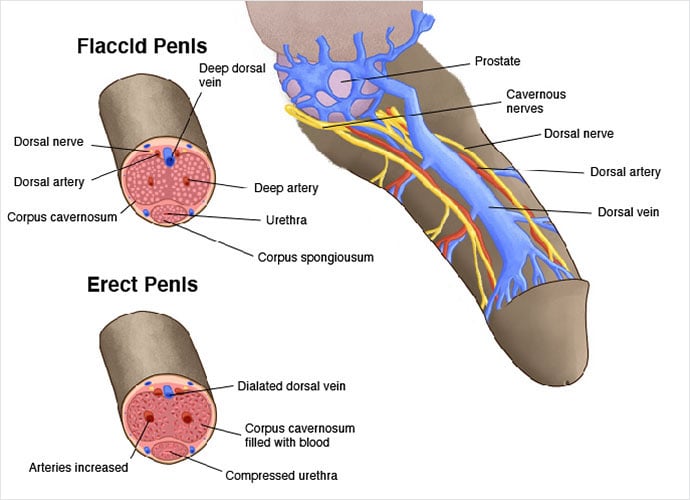Erectile dysfunction (ED) can be a distressing condition that affects a man's ability to achieve and maintain an erection. It can have a significant impact on both physical and emotional well-being, leading to a loss of confidence and strain on relationships. However, it's important to recognize that there are effective strategies and solutions available to combat ED and restore confidence. In this article, we will delve into the world of erectile dysfunction, exploring the causes, symptoms, and treatment options that can empower men to overcome this condition and reclaim their confidence in the bedroom.
Understanding Erectile Dysfunction:
Erectile dysfunction (ED) refers to the consistent inability to achieve or maintain an erection sufficient for sexual activity. It is a common condition that affects men of all ages, with prevalence increasing with age.
There are various factors that can contribute to the development of ED. Physical causes may include underlying health conditions such as diabetes, heart disease, obesity, and hormonal imbalances. Psychological factors such as stress, anxiety, depression, and relationship issues can also play a role.
ED can have a significant impact on a man's mental and emotional well-being. It may lead to feelings of inadequacy, frustration, and lowered self-esteem. Additionally, it can create tension and strain in relationships, affecting both partners' intimacy and overall satisfaction.
It is important to understand that ED is a medical condition that can be effectively treated. By recognizing the causes and seeking appropriate help, men can regain control over their sexual health and improve their overall well-being. In the following sections, we will explore the available treatment options and strategies for managing and overcoming ED.

Seeking Professional Help:
When dealing with erectile dysfunction (ED), it is crucial to seek professional help from healthcare providers who specialize in men's sexual health. They play a vital role in diagnosing and treating the condition effectively.
Healthcare providers will conduct a comprehensive evaluation to determine the underlying causes of ED. This may involve a detailed medical history, physical examination, and possibly laboratory tests. By identifying the root causes, healthcare professionals can develop a personalized treatment plan.
Treatment options for ED vary depending on individual circumstances. Medications such as phosphodiesterase type 5 (PDE5) inhibitors, like sildenafil (Viagra) or tadalafil (Cialis), are commonly prescribed to enhance blood flow to the penis and facilitate erections. Other options may include hormone therapy, penile injections, or the use of vacuum erection devices.
In addition to medication, therapy can also be an essential component of ED treatment. Cognitive-behavioral therapy (CBT) or sex therapy can help address any psychological factors contributing to ED, improve self-confidence, and enhance intimate relationships.
Alongside medical intervention, making lifestyle changes can significantly impact ED. Adopting a healthy diet, engaging in regular physical exercise, managing stress levels, and quitting smoking can contribute to overall sexual health.
Open communication with healthcare professionals is vital throughout the entire process. Sharing concerns, asking questions, and discussing treatment options openly can lead to better outcomes. It is essential to be honest and provide accurate information to ensure a tailored treatment approach.
Remember, seeking professional help for ED is a proactive step towards reclaiming sexual health and overall well-being. Healthcare providers are there to support and guide individuals on their journey to overcome ED and regain confidence in their intimate relationships.

Psychological Support:
Dealing with erectile dysfunction (ED) can have a significant emotional impact on individuals and their partners. It is essential to address the psychological aspects of ED to enhance overall well-being and restore sexual confidence.
One common emotional effect of ED is a decrease in self-esteem and body image. Men may experience feelings of inadequacy, shame, or embarrassment due to their perceived inability to perform sexually. These negative emotions can further exacerbate ED and create a cycle of anxiety and fear surrounding sexual encounters.
Seeking therapy or counseling can be incredibly beneficial in addressing the psychological barriers associated with ED. A qualified therapist or counselor can provide a safe and supportive environment to explore and work through these emotions. They can help individuals develop coping strategies, challenge negative beliefs, and improve self-confidence.
Cognitive-behavioral therapy (CBT) is a commonly used approach in addressing the psychological impact of ED. It focuses on identifying and modifying negative thought patterns and behaviors that contribute to sexual anxiety and performance issues. Through CBT, individuals can develop healthier attitudes towards their sexuality and gain a more positive outlook on their ability to engage in satisfying sexual experiences.
In addition to therapy, open communication with partners is crucial. Sharing fears, concerns, and expectations can foster understanding and empathy. Couples may consider attending counseling sessions together to improve communication, strengthen emotional bonds, and explore alternative forms of intimacy and sexual satisfaction.
It is important to remember that seeking psychological support for ED is not a sign of weakness, but rather a proactive step towards reclaiming sexual confidence and overall well-being. By addressing the emotional impact of ED, individuals can develop a healthier mindset, enhance self-esteem, and enjoy more fulfilling intimate relationships.

Lifestyle Changes for Sexual Health:
Making certain lifestyle changes can have a positive impact on sexual health and help combat erectile dysfunction (ED). By incorporating healthy habits into your daily routine, you can improve overall well-being and enhance sexual function.
Regular exercise has been shown to improve blood flow, boost energy levels, and promote cardiovascular health, all of which are essential for healthy sexual function. Engaging in physical activities such as walking, jogging, cycling, or strength training can help improve stamina and enhance sexual performance.
Maintaining a balanced and nutritious diet is also crucial for sexual health. Certain foods, such as those rich in antioxidants, vitamins, and minerals, can support proper blood circulation and hormone production. Including fruits, vegetables, whole grains, lean proteins, and healthy fats in your diet can provide the necessary nutrients for optimal sexual function.
It is important to avoid habits that can contribute to ED, such as smoking and excessive alcohol consumption. Smoking damages blood vessels and reduces blood flow to the penis, making it harder to achieve and maintain an erection. Excessive alcohol consumption can impair sexual performance and decrease libido. Limiting or eliminating these habits can significantly improve sexual health.
Stress and anxiety can also contribute to ED. Finding effective stress management techniques, such as meditation, deep breathing exercises, or engaging in hobbies and activities you enjoy, can help reduce anxiety levels and improve sexual performance.
By adopting a healthy lifestyle that includes regular exercise, a balanced diet, and stress management techniques, you can support optimal sexual health and improve your chances of overcoming ED. These lifestyle changes not only benefit your sexual function but also enhance overall well-being and quality of life.

Communication and Intimacy:
When dealing with erectile dysfunction (ED), open and honest communication with your partner is essential. By discussing ED openly, you can alleviate any anxiety or tension and work together to find solutions that meet both of your needs.
It's crucial to create a safe and non-judgmental space where you and your partner can express your feelings, concerns, and desires. Sharing your experiences and emotions surrounding ED can help build trust, understanding, and empathy between you.
While penetrative sex may be challenging during episodes of ED, it's important to explore alternative forms of intimacy that can still provide pleasure and strengthen your emotional connection. Non-penetrative sexual activities, such as sensual massage, kissing, cuddling, and oral sex, can be enjoyable and intimate experiences that focus on pleasure, touch, and emotional closeness.
Taking the time to understand and satisfy your partner's desires and needs can also enhance intimacy. Communication and active listening are key to discovering what brings pleasure to your partner. By exploring new techniques, fantasies, or intimate moments together, you can deepen your connection and foster a fulfilling sexual relationship.
It's essential to remember that intimacy extends beyond physical pleasure. Emotional intimacy and affectionate gestures, such as cuddling, holding hands, or simply spending quality time together, are equally important in maintaining a strong and intimate bond.
By openly communicating about ED, exploring non-penetrative sexual activities, and focusing on emotional connection, you and your partner can navigate the challenges of ED together and find new ways to experience intimacy and pleasure. Remember that building and maintaining a fulfilling sexual relationship requires patience, understanding, and a willingness to adapt to each other's needs and desires.

Alternative Therapies:
In addition to traditional medical treatments, there are alternative therapies that some men may consider exploring for erectile dysfunction (ED). These therapies often focus on using natural remedies and supplements to address the underlying causes of ED and promote sexual health. While they may not work for everyone, some men have found them beneficial in improving their condition.
One alternative therapy worth considering is acupuncture. Acupuncture involves the insertion of thin needles into specific points on the body to stimulate energy flow and promote healing. Some studies suggest that acupuncture may help improve erectile function by increasing blood flow and reducing stress levels. However, it's important to consult with a qualified acupuncturist and discuss your specific concerns and medical history before undergoing treatment.
Herbal treatments are another avenue to explore. Certain herbs, such as ginseng, horny goat weed, and maca root, have been traditionally used for centuries to enhance sexual function. These herbs are believed to improve blood flow, boost libido, and support overall sexual health. However, it's crucial to remember that herbal treatments are not regulated in the same way as prescription medications, and their safety and efficacy may vary. It's recommended to consult with a healthcare professional who specializes in herbal medicine to discuss potential benefits and risks.
When considering alternative therapies, it's important to have an open and honest conversation with your healthcare provider. They can provide valuable guidance, assess potential interactions with any medications you may be taking, and help you make informed decisions about incorporating alternative therapies into your treatment plan.
It's worth noting that alternative therapies should not replace conventional medical treatments for ED. They should be seen as complementary approaches that can be used alongside prescribed medications or lifestyle changes. It's crucial to prioritize your safety and well-being by seeking guidance from qualified healthcare professionals and being mindful of potential risks or interactions.
Remember, what works for one person may not work for another, so it's important to approach alternative therapies with an open mind and realistic expectations. Your healthcare provider can help guide you in determining the best approach for your individual needs and preferences.
Conclusion:
Erectile dysfunction can be a challenging condition, but with the right strategies and support, men can regain their confidence and enjoy fulfilling sexual relationships. By understanding the causes of ED, seeking professional help, making lifestyle changes, and fostering open communication with partners, men can reclaim their confidence and overcome the obstacles posed by erectile dysfunction.








